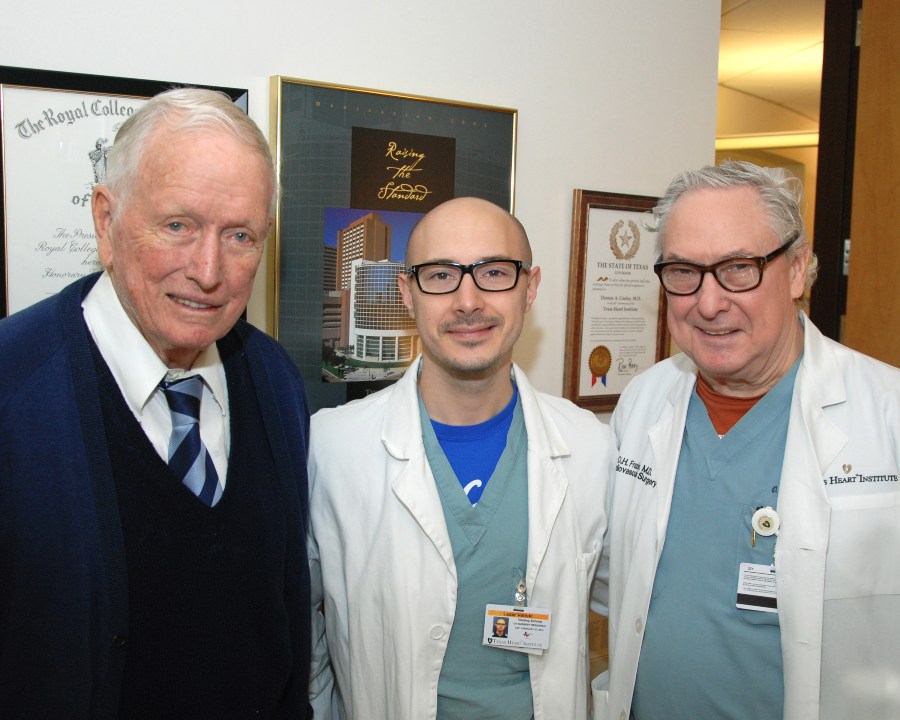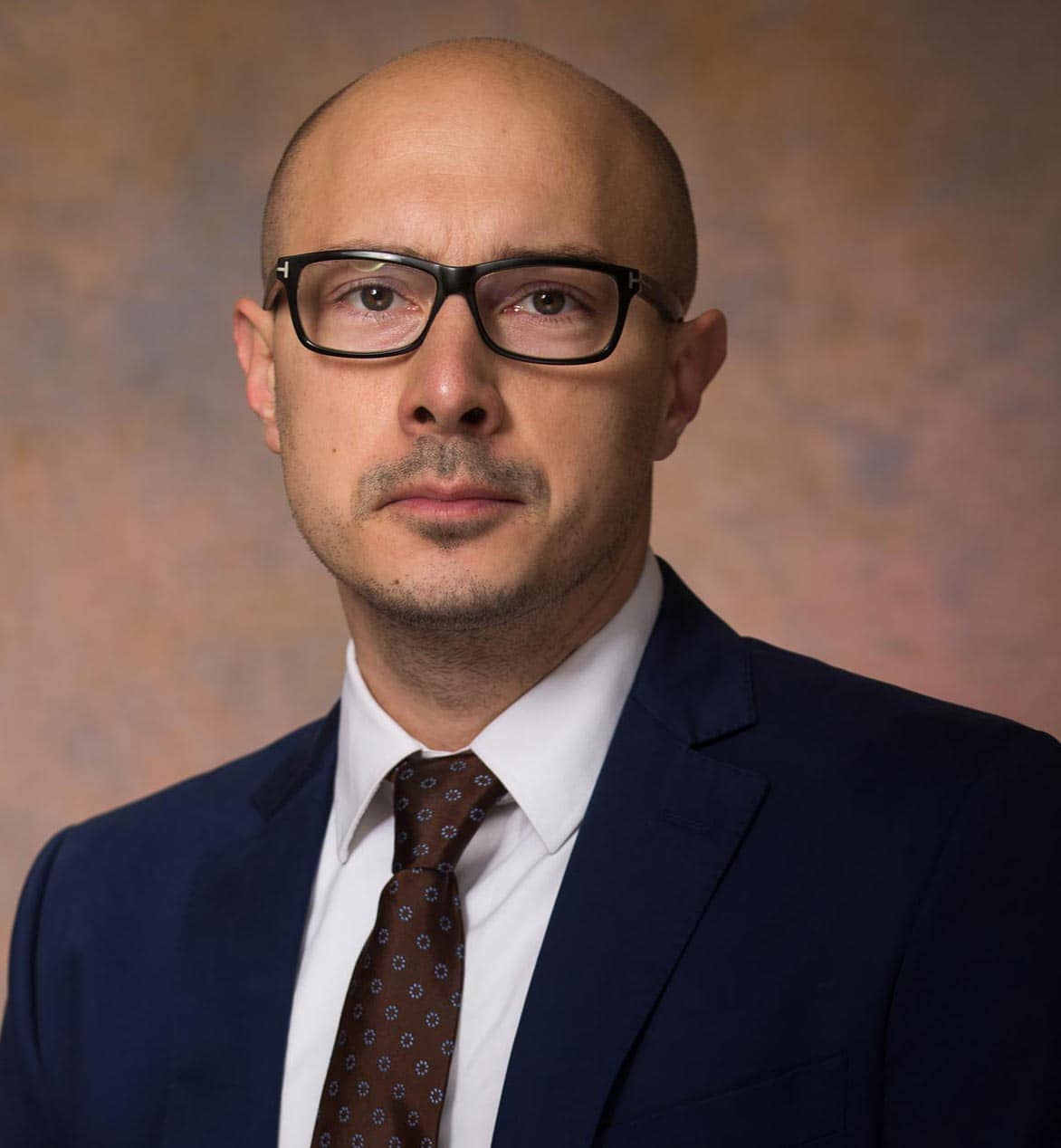
Dr Denton Cooley i Dr Bud Frazier (Texas Heart Institute, Houston, USA)
Where does the desire to do cardiac surgery come from?
As a medical student, during my surgery practicals, I had the opportunity to work with a surgeon who, while we were preparing the operative field together, asked me to retell short biographies of various surgeons that I had read in the meantime. The life and endeavors of the cardiac surgeon particularly attracted me because their accomplishments were the most fascinating to me. I love anatomy and physiology, creative and visual aspects of surgery, and I have absolute awe for heart surgery. What makes this branch of surgery so special is the fact that it provides the opportunity for complete recovery after surgery and a return to everyday life. I consider the opportunity to do this job a privilege and an occasion that I do not take for granted.
What cardiovascular diseases do I treat most often?
I treat a wide range of heart conditions that include coronary heart disease (ischemic heart disease), valvular heart disease (heart valve disease), certain heart arrhythmias, heart failure, aortic disease, and certain heart tumors.
Many patients present with a symptom of shortness of breath, which is usually the first sign of the disease. After the diagnosis, it is sometimes determined that this symptom is not related to a diseased heart at all, but to a disease of other organs, e.g. lungs or with endocrinological and rheumatic diseases. Then some patients have been complaining of shortness of breath for a long time but have attributed it to weight gain or thyroid dysfunction, or the daily stress we are all exposed to.
When talking to patients, medical doctors can quickly determine if there are underlying heart diseases behind the symptoms. After the interview, the patient is evaluated and clinically examined. We can find out a lot about the heart only if we listen to the heart with a stethoscope or do an X-ray and look at the size of the heart. An electrocardiogram (ECG) showing the electrical activity of the heart is also mandatory. An unavoidable examination is also an ultrasound of the heart, which establishes the status of the heart valves and the walls of the heart, as well as the dimensions of the heart chambers.
What are the symptoms that make people come to a cardiologist?
Several symptoms indicate that the heart is not working properly: chest pain, palpitations (irregular heartbeats), shortness of breath, dizziness, weakness, or fatigue. The symptoms I encounter, especially in women, are back and jaw pain, which can even manifest as a toothache. Women who have a heart attack can have a completely different spectrum of symptoms than men.
You've probably heard that the most common symptoms of a heart attack are tightness and chest pain - the patient often pictorially describes the pain: the feeling of an "elephant on the chest". Besides, back pain or shortness of breath is common.
Is it hard to tell someone that they need heart surgery?
I try to communicate this important and not at all pleasant information to the patient in the simplest possible way. This is difficult knowledge for patients, knowledge that overwhelms them. Usually, I start the conversation with the patient in the following way:
"You have chest pain as a result of coronary artery disease. We have found a blockage in one or more arteries in your heart, which means that a certain part of the heart muscle does not receive enough blood and oxygen. To solve the problem and treat you, we will use an artery from the wall of your chest or a vein in your leg and bypass that blockage so that your heart gets enough blood that it needs and to prevent long-term irreversible damage. This operation is also called bypass surgery."
I think it is important to be in direct contact with patients and to be sure that the message is clearly and unambiguously conveyed.
Heart surgery is an extremely dynamic field of medicine, full of challenges and improvisations, which makes it a very creative skill. Part of my responsibility is to keep up to date with current clinical studies and ongoing clinical trials. An increasing number of our patients are informed via the Internet before the operation about the disease itself and the course of treatment. To avoid unnecessary anxiety and misinterpretation of what was read, I believe that talking to a doctor before the operation is essential to clarify all dilemmas and define expectations. In doing so, I support and encourage family members of the patient to participate in the consultation.
It is always necessary to emphasize the importance of healthy lifestyles!
Most certainly, although we are aware and witness that it is challenging to implement lifestyle changes in practice. However, the results of available research show that recovery after cardiac surgery is significantly better if the patient does not have risk factors such as smoking, alcohol consumption, improper diet, and insufficient physical activity. For that reason, the period after the operation is very often a turning point in the patient's life and may adopt and maintain healthy living habits for a long time.
I absolutely encourage any, even very small movement in the right direction such as accelerating the heart rate for 30 minutes a day by walking, climbing stairs, instead of using the elevator, of course, provided the patient has no ailments and diseases like unstable angina, impaired pulmonary reserves or any physical damage. We also advise patients to park their cars away from the building so that they can walk a little longer to their homes.
If you are not sure how to change your diet, I advise you to seek the help of nutrition professionals.
These tips apply to all ages, right?
Yes. It is important to educate young people about the importance of establishing healthy life habits early in life. What they now and how they behave can later make a significant difference, because, indeed, coronary heart disease begins to develop as early as age 18. Initial hypertension and high cholesterol are diagnosed earlier, so we want young people to pay attention to diet and exercise. In our youth, we don't think too much about chronic diseases, we often think that it happens to someone else, but we are witnesses that in the last few decades the age limit for many chronic diseases has dropped significantly and that in the 30s and 40s serious even life-threatening health problems. So, the most important thing is to establish a solid and healthy foundation as early as possible.
How does drvelicki.com help with that?
The idea is that patients and interested individuals get all the necessary information regarding cardiovascular diseases in one place, from the aspect of the diseases themselves, current therapeutic modalities, but also preventive measures. For this reason, a large number of our eminent experts, with their advice, try to point out the importance of disease prevention, acquisition, and adoption of healthy living habits, but also to provide answers to questions about how to treat certain diseases in the best way. The aspect of recovery after heart surgery is certainly important, and for that reason, I have prepared a special informant for cardiac patients who guides them step by step through each phase of hospital treatment until the moment of discharge from the hospital after successful surgery.

Any questions?